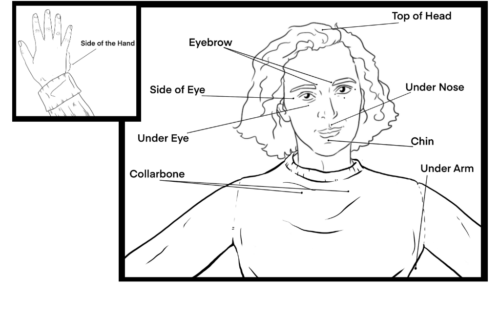
Resources for Teaching Greek Kids EFT Tapping
WHAT’S THE ISSUE: While most children in Greece are learning English, the fact that we didn’t have culturally sensitive resources for teaching Greek kids EFT Tapping has been a challenge for Greek teachers, parents and school psychologists. Fortunately, in the last two years, two great resources have been ‘born’ that can be included in an introduction to EFT Tapping for kids ages 4-7.
TEACHING GREEK KIDS EFT TAPPING
1. ERTFLIX “HAHANA KIDS” CARTOON SERIES
This resource for teaching Greek kids aged 4-7 years old EFT Tapping is part of a Greek-produced cartoon show created by Tasos Ioannidis.
I think the genius thing about this resource is how seamlessly the ERTFlix production team has merged Greek kids’ cultural references as a ‘way in’ to teaching EFT Tapping in several ways. For example, the singing and clapping in between tapping points that the actor uses to demonstrate a round of EFT Tapping is based on a popular children’s song that is well-established in Greek culture.
Resources like this merge the familiar (in this case, a well-known Greek children’s song) with the unfamiliar (a new stress management technique) to help boost accessibility to EFT for non-English speaking school populations.
2. TAPPING BOOK FOR CHILDREN UP TO 10 YEARS OLD
Primary school teacher and EFT Practitioner, Marina Koutra, has written and illustrated a book for Greek children called ‘The reds and the greens”. Marina’s intention was to create a resource that we can use to help children become more aware of the impact that their own behaviours in conflicts can have on others. Sometimes children aren’t aware that their behaviours and unconscious beliefs of seeing the world in a divisive ‘us’ versus ‘them’ way can be passed on from generation to generation.Yet at are core, we are all the same – we are all humans.

Κούτρα Μαρίνα, 2023, Οι πράσινοι και οι κόκκινοι (Εκδ. Αλφάβητο Ζωής)
My review of this children’s book:
- Η Μαρίνα προσφέρει στους εκπαιδευτικούς ένα βιβλίο που μπορεί να χρησιμοποιηθεί για να καλλιεργηθεί η περιέργεια και τη γνώση των μαθητών στις κοινωνικές και συναισθηματικές δεξιότητες. Καθώς η αλληγορία της Μαρίνας για τα παιδιά ξετυλίγεται, οι μαθητές έχουν ευκαιρίες να σκεφτούν πώς τα ανεπεξέργαστα συναισθήματά μας μπορεί να επηρεάσουν τις συμπεριφορές μας απέναντι σε άλλους ανθρώπους. Μέσα από τον ενσυναίσθητο χαρακτήρα, τον Θοδωρή, γίνεται εισαγωγή ορισμένων σημείων του EFT, με τρόπο που μοντελοποιεί την αυτοπαρατήρηση που απαιτείται για μεγαλύτερη συνοχή στην τάξη. Το βιβλίο αποτελεί ένα πολύτιμο εργαλείο για να υποστηριχθεί η καλή ψυχοσυναισθηματική κατάσταση των ατόμων στο σχολείο.
- Ελένη Βαρδάκη, Educational Consultant, EFT Practitioner
Aremu, A. O., & Taiwo, A. K. (2014). “Reducing Mathematics Anxiety Among Students with Pseudo-Dyscalculia in Ibadan through Numerical Cognition and Emotional Freedom Techniques: Moderating Effect of Mathematics Efficacy.” African Journal for the Psychological Studies of Social Issues, 17(1), 113–129.
Gaesser, A. H., & Karan, O. C. (2017). “A Randomized Controlled Comparison of Emotional Freedom Technique and Cognitive-Behavioral Therapy to Reduce Adolescent Anxiety: A Pilot Study.” Journal of Alternative and Complementary Medicine, 23(2), 102-108. Randomized Controlled Clinical Trial. Doi:10.1089/acm.2015.0316
Gaesser, A. H. (2014). “Interventions to Reduce Anxiety for Gifted Children and Adolescents.” Doctoral Dissertations, 377. Randomized Controlled Clinical Trial. http://digitalcommons.uconn.edu/dissertations/377
Jain, S., & Rubino, A. (2012). “The Effectiveness of Emotional Freedom Techniques (EFT) for Optimal Test Performance: A Randomized Controlled Trial.” Energy Psychology: Theory, Research, & Treatment, 4(2), 13-24. Randomized Controlled Clinical Trial. Doi:10.9769.EPJ. 2012.4.2.SJ
Lambert, M. T., Smith, S. E.; Moss, S., Kirshbaum, M. N. (2022) “Emotional Freedom Techniques (Tapping) to Improve Wellbeing and Reduce Anxiety in Primary Classrooms”, Australian Journal of Teacher Education, 7 (3). https://ro.ecu.edu.au/ajte/vol47/iss3/5/
Sezgin, N., & Özcan, B. (2009). “The Effect of Progressive Muscular Relaxation and Emotional Freedom Techniques on Test Anxiety in High School Students: A Randomized Controlled Trial.” Energy Psychology: Theory, Research, and Treatment, 1(1), 23-30. Randomized Controlled Clinical Trial.
Sezgin, N., Ozcan, B., Church, D., (2009). “The Effect of Two Psychophysiological Techniques (Progressive Muscular Relaxation and Emotional Freedom Techniques) On Test Anxiety in High School Students: A Randomized Blind Controlled Study.” International Journal of Healing and Caring, 9(1). Randomized Controlled Clinical Trial.
Stapleton, P., Mackay, E., Chatwin, H., Murphy, D., Porter, B., Thibault, S. Pidgeon, A. (2017). “Effectiveness of a School-based Emotional Freedom Techniques Intervention for Promoting Student Wellbeing.” Adolescent Psychiatry, 7(2), 112-126. Randomized Controlled Clinical Trial.
Benor, D. J., Ledger, K., Toussaint, L., Hett, G., & Zaccaro, D. (2009). “Pilot study of Emotional Freedom Technique (EFT), Wholistic Hybrid derived from EMDR and EFT (WHEE) and Cognitive Behavioral Therapy (CBT) for treatment of test anxiety in university students” Explore, 5(6). Randomized Controlled Clinical Trial.
Boath, E., Stewart, A., Carryer, A. (2011). “Tapping for Success: A Pilot Study to Explore if Emotional Freedom Techniques (EFT) Can Reduce Anxiety and Enhance Academic Performance in University Students.” Innovative Practice in Higher Education, 1(3).
Boath, E. Stewart, A. Carryer, A. (2013). “Is Emotional Freedom Techniques (EFT) Generalizable? Comparing Effects in Sport Science Students Versus Complementary Therapy Students.” Energy Psychology Journal, 5(2). Doi: 10.9769.EPJ.2013.5.2.EB.AC.AS.SU
Boath E., Good R., Tsaroucha A., Stward T., Pitch Sh., & Boughey A. (2017) “Tapping Your Way to Success: Using Emotional Freedom Techniques (EFT) to Reduce Anxiety and Improve Communication Skills in Social Work Students”, Social Work Education: The International Journal, 715-730, Doi:10.1080/02615479.2017.1297394
Dincer B, Özçelik SK, Özer Z, Bahçecik N. (2022) “Breathing Therapy and Emotional Freedom Techniques on Public Speaking Anxiety in Turkish Nursing Students: A Randomized Controlled Study. Explore (NY). 18(2), 226-233. Doi:10.1016/j.explore.2020.11.006.
Nenden LW, Tukimin S., Dwiagung R., Agus S. (2022) “The Effectiveness of Emotional Freedom Technique on Public Speaking Anxiety in University Students: An Integrated Review”, Open Access Macedonian Journal of Medical Sciences, 10(F):263-268 Doi:10.3889/oamjms.2022.7919
Patterson SL. (2016) “The Effect of Emotional Freedom Technique on Stress and Anxiety in Nursing Students: A Pilot Study”, Nurse Education Today, 40:104-10. Doi: 10.1016/j.nedt.2016.02.003.
Rogers R, Sears SR. (2015) “Emotional Freedom Techniques for Stress in Students: A Randomized Controlled Dismantling Study.” Energy Psychology Theory Res Treatment, 7:26–32. Doi:10.9769/EPJ.2015.11.1.RR
Bach, et al (2019), “Clinical EFT (Emotional Freedom Techniques) Improves Multiple Physiological Markers of Health”, Journal of Evidence-Based Integrative Medicine, Vol 24.
Church, et al (2012) “The Effect of Emotional Freedom Techniques on
Stress Biochemistry: A Randomized Controlled Trial”, The Journal of Nervous and Mental Disease, Vol 200.
Dawson, et al (2018), “Is Tapping on Acupuncture Points an Active Ingredient in Emotional Freedom Techniques? A Systematic Review and Meta-analysis of Comparative Studies”, The Journal of Nervous and Mental Disease, Vol 206.
Stapleton, et al (2020) “Reexamining the Effect of Emotional Freedom
Techniques on Stress Biochemistry: A Randomized Controlled Trial”, Psychological Trauma: Theory, Research, Practice, and Policy.
Maharaj, M. (2016) “Differential Gene Expression after Emotional
Freedom Techniques (EFT) Treatment: A Novel Pilot Protocol for Salivary mRNA Assessment”, Energy Psychology, Vol 8.
Church, et al (2018) “Epigenetic Effects of PTSD Remediation in Veterans using Clinical Emotional Freedom Techniques: A Randomized Controlled Pilot Study”, American Journal of Health Promotion, Vol 32.
Stapleton, et al (2018) “An Initial Investigation of Neural Changes in Overweight Adults with Food Cravings after Emotional Freedom Techniques”, OBM Integrative and Complementary Medicine Journal, Vol 3.
Stapleton, et al (2022) “Neural changes after Emotional Freedom Techniques treatment for chronic pain sufferers”, Journal of Complementary Therapies in Clinical Practice, Vol 49.
Wittfoth, et al (2022) “Bifocal Emotion Regulation Through Acupoint Tapping in Fear of Flying”, Journal of NeuroImage: Clinical, Vol 34 .
Wittfoth, et al (2020) “Emotion Regulation through Bifocal Processing of Fear Inducing and Disgust Inducing Stimuli”, BMC Neuroscience Journal, Vol 21.
Stapleton, P. (2019) The Science Behind EFT: A Proven Stress Management Technique for Mind and Body.
Stapleton, P. (2023) Memory Improvement Through EFT Tapping: A Way to Boost Recall and Clarity.
ABOUT THE AUTHOR

Eleni Vardaki is an experienced teacher and EFT Tapping Coach who specialises in stress, anxiety, and academic success. She works with school and university level level students online who want to work with her on clearing inner blocks to achieving their personal, career-related, or academic goals. She also leads online and in-person group sessions for staff, parent, and student well-being.




